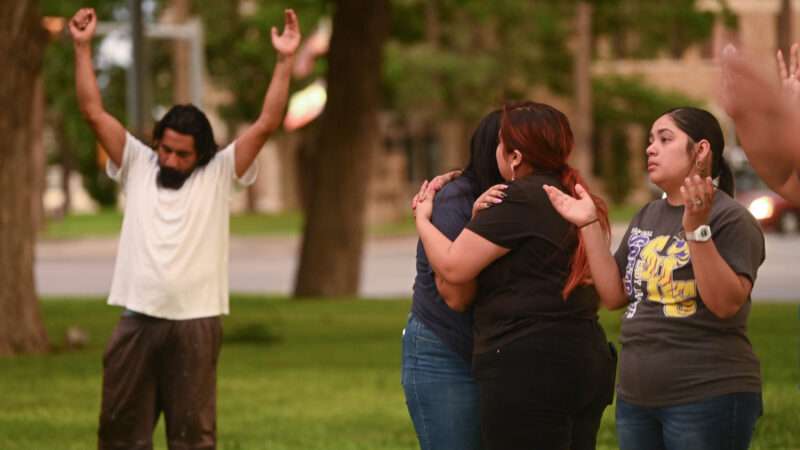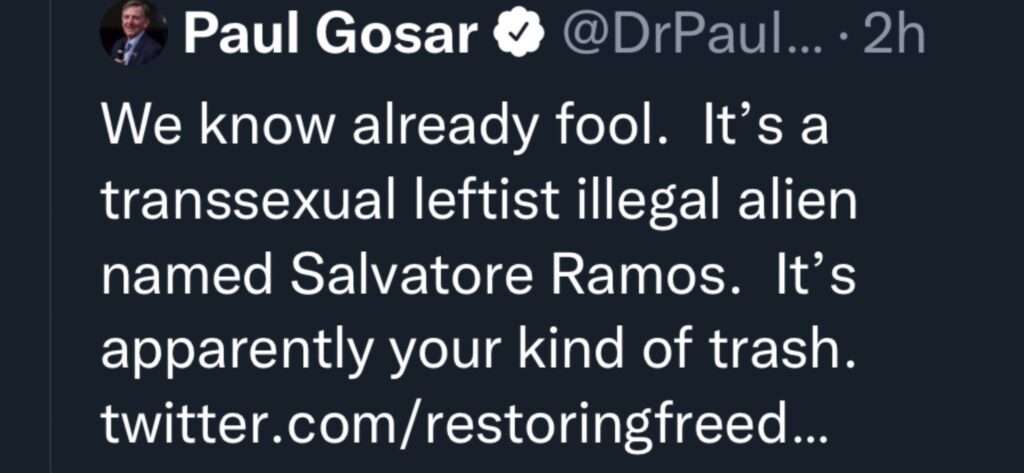
It's hard to know what to say about yesterday's tragedy in Uvalde, Texas, during which at least 19 children and 2 adults were killed by 18-year-old gunman Salvador Ramos. Ramos reportedly shot his grandmother before crashing his car and getting into a shootout with police before running into Robb Elementary School, going on a killing spree, and being shot to death by a Border Patrol agent who had responded to the scene. It's still unclear if the school was Ramos' deliberate target, why he chose to commit such terrible acts of violence, or what type of gun he used (initial reports say he had both a handgun and a rifle). What we do know is that this is the second-deadliest school shooting in U.S. history, following the Sandy Hook Elementary School shooting almost a decade ago that left 26 people dead.
Sgt. Erick Estrada of the Texas Dept of Public Safety tells @andersoncooper the shooter crashed his car near the school, got out with a gun and wearing body armor, was engaged by law enforcement, but made his way into the school anyway and went classroom to classroom shooting.
— Natasha Bertrand (@NatashaBertrand) May 25, 2022
It's understandable that people want someone other than one deranged (and now deceased) individual to be at fault here. It's understandable—if unfortunate and unproductive—that human anger and fear tends to take the form of looking for larger forces to blame and lashing out at whatever is available. It's incredibly difficult and depressing to process tragedies like these. People want an easy solution, and obvious villains to incur their wrath and sadness.
With smug righteousness, many keep asserting that we could stop mass shootings if only a certain type of gun were banned, or all guns were banned, or some specific new gun restrictions were enacted. But these are fantasies. Even if Congress could pass any gun restriction that advocates desire today—including a total ban on all guns—it would be impossible to enforce and almost definitely fail to have the impact people wish for.
Banning abortion isn't gonna stop abortions it's just going to drive people who want abortions into unsafe situations but banning guns will stop guns. Same people.
— ???????????? (@formerlyed) May 25, 2022
There are more guns than people in the U.S. and Americans aren't going to simply cooperate with a gun buyback program, for example, the way many Australians did when their government started such a program.
A bigger black market in guns would most likely just create more violent crime, and a bigger effort by police to confiscate or crack down on guns would inevitably lead to more police violence.
People may be emotionally soothed by platitudes around all this—an insistence that we could at least try—but the reality is that the trying itself could lead to a lot of violence.
If police are having a hard time controlling every other type of crime at the moment, they're going to track down and eliminate 400 million guns like that?
— Zaid Jilani (@ZaidJilani) May 25, 2022
And banning certain types of guns, enacting longer waiting periods for gun purchases, and requiring enhanced background checks often fail to prevent homicides and would have failed to prevent many of the mass shootings we've seen recently. What makes people so sure they would work against future mass shootings?
Even "red flag" laws (which allow for courts to order the confiscation of guns from people with mental health issues) are not the panacea people purport them to be. "Predicting violence is much harder than supporters of red flag laws often imply," notes Reason's Jacob Sullum. "Psychiatrists are notoriously bad at it, and people who display what might look like 'red flags' almost never commit crimes like these."
The "ban guns" crowd is far from alone in irrational blame laying, of course. On the right, this impulse has taken a particularly ugly form, with some suggesting, based on the gunman's name, that he is an immigrant and that lax immigration policies or border control are somehow the issue here.
The idea that one immigrant committing a crime implicates all immigration is absurd and xenophobic. On top of that, Ramos was born in North Dakota.
Pray for the victims, families and community. The killer was Salvador Ramos 18 years old. Did he cross the border illegally? Our nation has a serious national security crisis evolving. God help us???????? https://t.co/PHdb02RN0k
— Code of Vets
(@codeofvets) May 24, 2022
And of course no tragedy can take place these days without someone on the right trying to blame gender politics or transgender people. This time, it was Rep. Paul Gosar (R–Ariz.), who has since deleted his tweet saying, sans evidence, that the Uvalde shooter was a "transsexual leftist illegal alien."

Now is a time to grieve those lost, memorialize their lives, and support the families and communities of the deceased. As hopeless and unsatisfying as it sounds, there's not much more we can realistically do. And while I'm sympathetic to the urge to do something in the wake of horrors like these, investing so much argument and emotional energy in doing things that won't actually make a difference only serves to divide people, center the emotions of bystanders, and detract from the very real lives and communities at the center of this shooting.
FREE MINDS
Florida law requiring social media to host political candidate speech violates First Amendment. A federal court has partially blocked Florida's social media law, which required large online platforms to indiscriminately host messages by political candidates and media outlets. A three-judge panel of the U.S. Court of Appeals for the 11th Circuit said the law ran contrary to the First Amendment. You can read the full ruling here.
The law (S.B. 7072) was "passed by Florida Republican lawmakers and supported by Gov. Ron DeSantis," notes Reason's Scott Shackford. In addition to threatening social media platforms with fines of up to $250,000 per day for failing to spread the messages of all political candidates, it "had a host of terrible provisions," Shackford points out.
Tech groups sued to try to block the bill's implementation and quickly got an initial temporary injunction last June, ordered by U.S. District Judge Robert Hinkle of the Northern District of Florida.
The three 11th Circuit Court of Appeals judges, all of whom were appointed by Republican presidents, ruled Monday that, no, Florida cannot do what it's trying to do here. Facebook, TikTok, Twitter, and others are private companies with First Amendment rights and cannot be required to serve as platforms for political content nor host media outlets' content against the tech companies' own wills.
Judge Kevin C. Newsom, who wrote the decision, bluntly rejects Florida's efforts to try to portray social media platforms as neutral "common carriers" like phone lines or public utilities:
"Platforms are private enterprises, not governmental (or even quasi-governmental) entities. No one has an obligation to contribute to or consume the content that the platforms make available. And correlatively, while the Constitution protects citizens from governmental efforts to restrict their access to social media … no one has a vested right to force a platform to allow her to contribute to or consume social-media content."
The Florida law is similar to a law passed in Texas that an appeals court recently said the state could start enforcing.
FREE MARKETS
Pushback against Biden's antitrust cops. A bid by semiconductor company Broadcom to buy VMware has antitrust debate raging again. From The New York Times:
The country's top deal cops, the Federal Trade Commission head Lina Khan and the Justice Department's Jonathan Kanter, have been pushing for the government to have more authority to block corporate deals. But criticism is mounting that antitrust efforts have gone too far, the DealBook newsletter reports. This week, Lawrence H. Summers, a Harvard University professor and former top adviser in the Obama administration, tweeted that a new era of "populist antitrust policy" could lead to an economy that was "more inflationary and less resilient."
In the past, a deal like Broadcom's potential acquisition of VMware would not have been an issue. The two companies are not direct competitors. Instead, the acquisition in deal terms is closer to what is often called a vertical integration — when one company buys another in a related industry. Horizontal deals, where the two companies are direct rivals, have traditionally been the ones that the government has policed, fearing that fewer competitors in one market would lead to higher prices.
Government officials are signaling that vertical and other deals are problematic as well. "By myopically treating transactions as vertical or horizontal, we may miss important details that a broader perspective can provide," the F.T.C. commissioner Rebecca Slaughter said last year. In addition, the Senate majority leader Chuck Schumer is reportedly pushing for a vote by early summer on legislation that he and others argue will address the way Big Tech has exploited gaps in antitrust regulations to eliminate competition.
QUICK HITS
• Omicron subvarient BA.2.12.1 is now the dominant strain of COVID-19 in the U.S.
• Former President Donald Trump was allegedly very afraid of getting pies thrown at him.
• How the drug war is keeping truckers off the road.
• "Sarah Huckabee Sanders will win the GOP nomination for governor of Arkansas," per CNN projections, "putting her in strong position to win the governorship in this red state in November."
The post After the Uvalde School Shooting, Politicians and Pundits Search for Panaceas appeared first on Reason.com.







